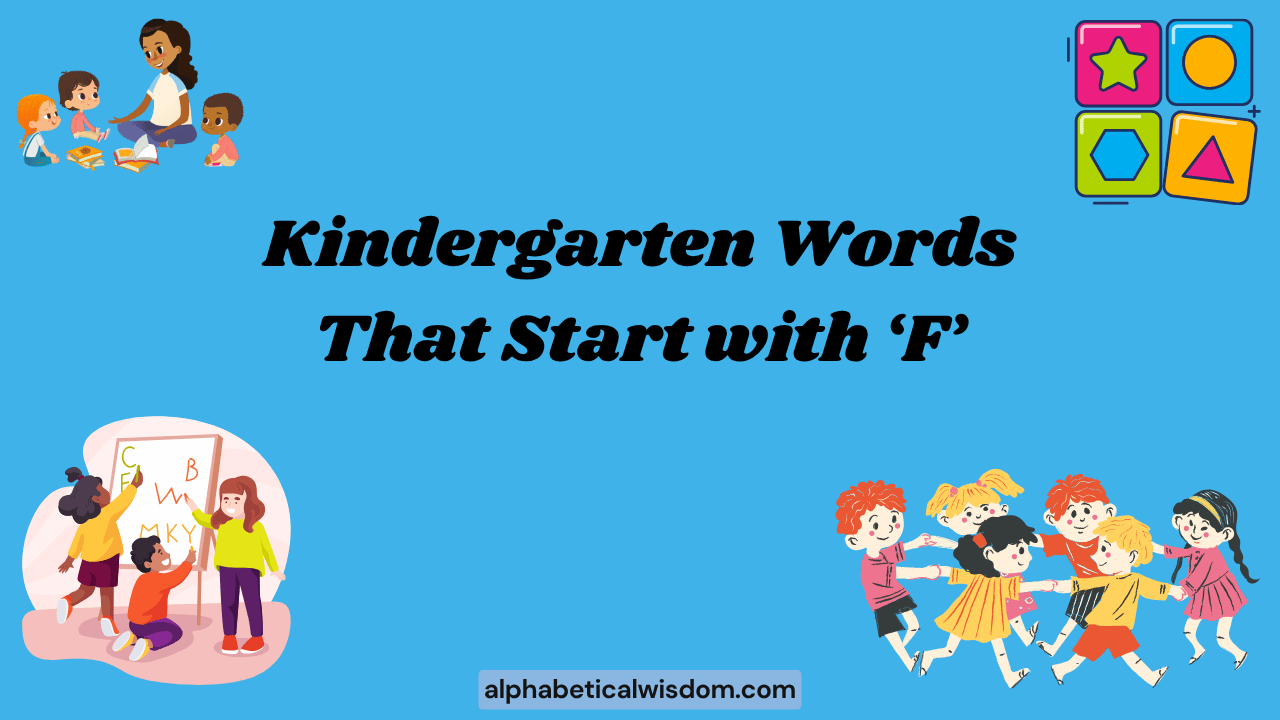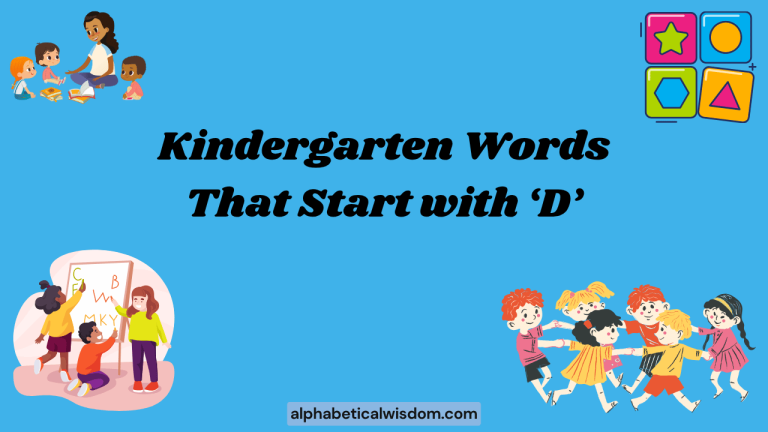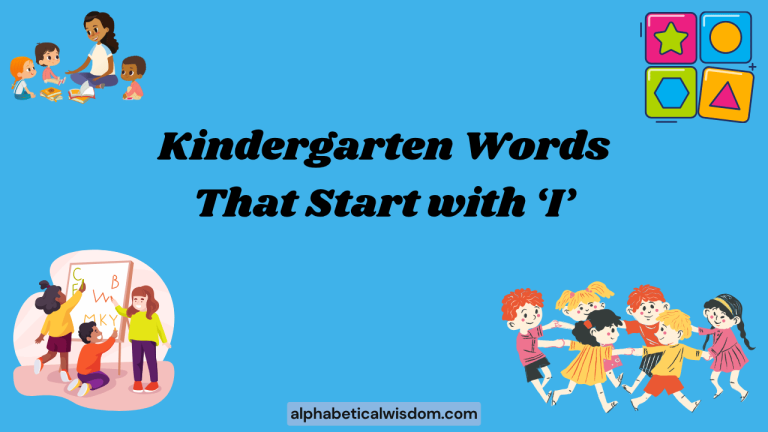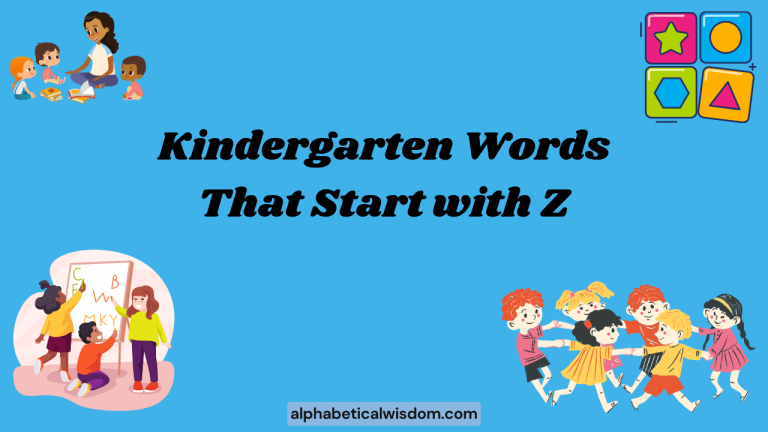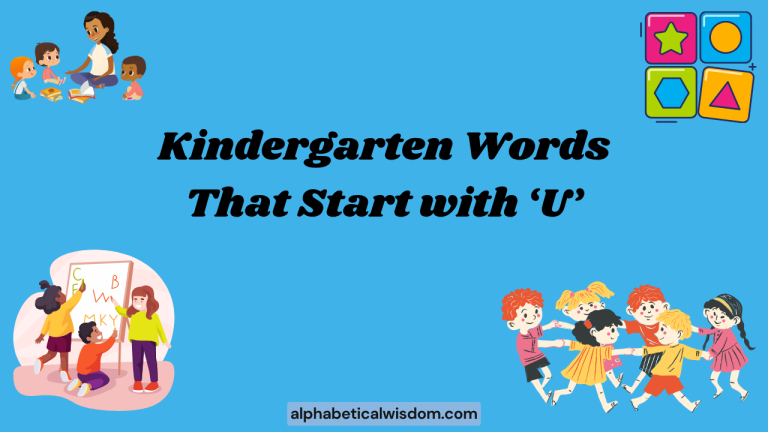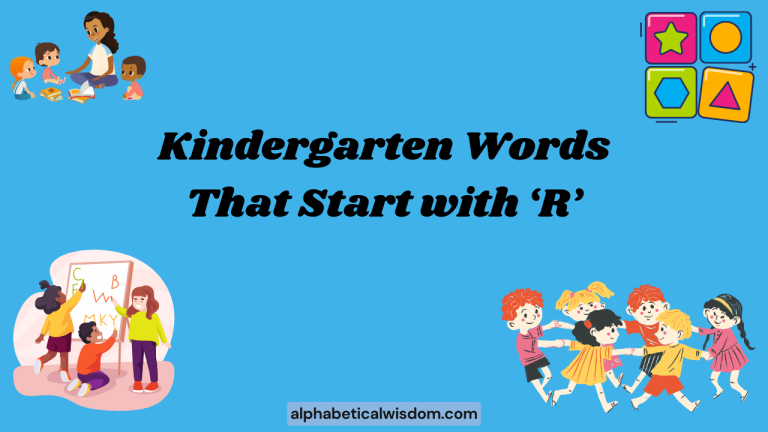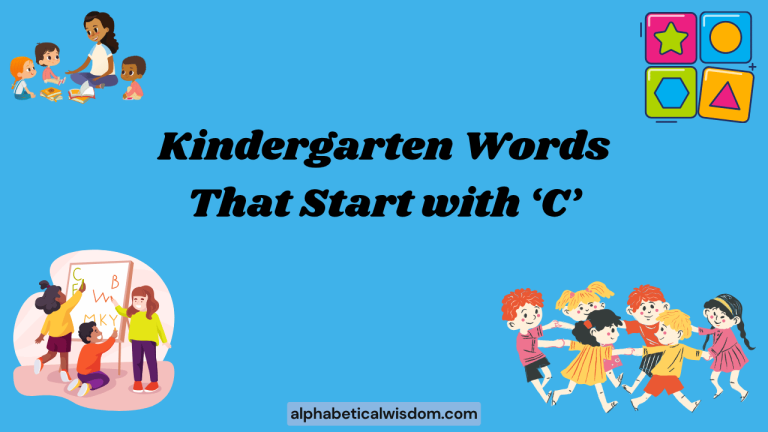Kindergarten Words That Start With F: A Comprehensive Guide
Understanding and mastering words that start with the letter ‘F’ is a fundamental step in a child’s early literacy journey. These words not only expand their vocabulary but also enhance their phonological awareness, reading fluency, and overall communication skills.
This article provides a comprehensive guide to kindergarten-level words beginning with ‘F’, offering definitions, examples, usage rules, and practice exercises to help young learners build a strong foundation in English.
This guide is designed for educators, parents, and anyone involved in early childhood education. By exploring these words, we aim to make learning engaging and effective, ensuring that children develop a confident and positive attitude towards language acquisition.
Let’s dive into the fascinating world of ‘F’ words!
Table of Contents
- Introduction
- Definition of Kindergarten Words Starting With ‘F’
- Structural Breakdown of ‘F’ Words
- Types and Categories of ‘F’ Words
- Examples of Kindergarten ‘F’ Words
- Usage Rules for ‘F’ Words
- Common Mistakes with ‘F’ Words
- Practice Exercises
- Advanced Topics
- FAQ: Frequently Asked Questions
- Conclusion
Introduction
The letter ‘F’ introduces a range of vocabulary words crucial for kindergarten students. Mastering these words contributes significantly to their reading, writing, and speaking abilities.
It’s not just about memorizing words; it’s about understanding their meanings and how to use them in context. This article serves as a comprehensive resource, offering detailed explanations, examples, and exercises to help children confidently navigate the world of ‘F’ words.
This guide is structured to accommodate different learning styles, providing visual aids, clear explanations, and interactive activities. Whether you are a teacher looking for classroom resources or a parent supporting your child’s learning at home, this article will equip you with the tools and knowledge needed to foster a love of language in young learners.
Let’s begin this exciting journey together!
Definition of Kindergarten Words Starting With ‘F’
Kindergarten words starting with ‘F’ are basic vocabulary terms suitable for children aged 4-6 years old. These words are typically simple in structure and meaning, often referring to familiar objects, actions, or concepts in a child’s environment.
Understanding these words is crucial for building a strong foundation in literacy and communication.
Classification
‘F’ words can be classified into various categories depending on their part of speech:
- Nouns: Words that represent people, places, things, or ideas (e.g., fish, flower, family).
- Verbs: Words that describe actions or states of being (e.g., find, fly, feel).
- Adjectives: Words that describe or modify nouns (e.g., fast, fun, few).
Function
The primary function of ‘F’ words in kindergarten is to enable children to express themselves effectively and understand simple written and spoken language. These words help children describe their world, ask questions, and engage in meaningful conversations.
Contexts
‘F’ words are used in a variety of contexts, including:
- Storytelling: Understanding ‘F’ words helps children follow narratives and comprehend characters’ actions.
- Everyday Conversation: These words are used in daily interactions at home, school, and in the community.
- Early Writing: Learning ‘F’ words enables children to write simple sentences and express their thoughts in written form.
Structural Breakdown of ‘F’ Words
The structure of ‘F’ words can be analyzed based on their phonetics, spelling, and morphology. Understanding these structural elements helps children decode and encode words more effectively.
Phonetics
The letter ‘F’ typically represents the /f/ sound, which is a voiceless labiodental fricative. This means the sound is produced by forcing air through a narrow channel between the lower lip and upper teeth.
Examples include:
- Fun: /fʌn/
- Fish: /fɪʃ/
- Fast: /fæst/
Spelling
Most ‘F’ words in kindergarten have simple spellings, often consisting of three to five letters. Common spelling patterns include:
- CVC (Consonant-Vowel-Consonant): Fan, Fox, Fit
- CVCC (Consonant-Vowel-Consonant-Consonant): Fast, Film
- CCVC (Consonant-Consonant-Vowel-Consonant): Flag, Frog
Morphology
Morphology refers to the structure of words and how they are formed. Kindergarten ‘F’ words are usually simple and do not involve complex prefixes or suffixes.
However, understanding basic morphological concepts is helpful:
- Root Words: Most ‘F’ words are root words, meaning they cannot be broken down further into smaller meaningful units (e.g., Flower, Friend).
- Inflections: Some ‘F’ words can be inflected to indicate tense or number (e.g., Find -> Finds, Find -> Found).
Types and Categories of ‘F’ Words
‘F’ words can be categorized based on various criteria, such as their part of speech, meaning, and frequency of use. Here are some common categories:
Nouns
Nouns are words that name people, places, things, or ideas. Examples of ‘F’ nouns include:
- Family
- Fish
- Flower
- Farm
- Food
- Friend
- Foot
- Face
- Finger
- Flag
Verbs
Verbs are words that describe actions or states of being. Examples of ‘F’ verbs include:
- Find
- Fly
- Feel
- Follow
- Fall
- Feed
- Fix
- Fight
- Fold
- Fry
Adjectives
Adjectives are words that describe or modify nouns. Examples of ‘F’ adjectives include:
- Fast
- Fun
- Few
- Fine
- Full
- Fair
- Fancy
- Far
- Flat
- Fresh
Adverbs
Adverbs are words that describe verbs, adjectives, or other adverbs. While less common in early kindergarten, some ‘F’ adverbs might be introduced:
- Fast (as in, “run fast”)
Examples of Kindergarten ‘F’ Words
Providing concrete examples is essential for helping children understand and remember new words. Here are several tables with examples of ‘F’ words, categorized by their part of speech, along with example sentences to illustrate their usage.
Nouns Examples
The following table provides a list of ‘F’ nouns suitable for kindergarten, along with example sentences:
| Word | Example Sentence |
|---|---|
| Family | My family loves to go to the park. |
| Fish | The fish swim in the pond. |
| Flower | The flower is red and beautiful. |
| Farm | We visited the farm and saw many animals. |
| Food | I like to eat healthy food. |
| Friend | My best friend is always kind to me. |
| Foot | I hurt my foot while playing. |
| Face | Wash your face with soap and water. |
| Finger | I have ten fingers on my hands. |
| Flag | The flag of our country is red, white, and blue. |
| Fork | Use a fork to eat your spaghetti. |
| Fire | Be careful around the fire. |
| Fox | The fox is a clever animal. |
| Feather | The bird has a colorful feather. |
| Field | We played in the open field. |
| Filling | The pie has a sweet apple filling. |
| Film | We watched a funny film. |
| Fin | The shark has a big fin. |
| Floor | The floor is clean and shiny. |
| Fog | The fog made it hard to see. |
| Forest | The forest is filled with tall trees. |
| Front | Stand at the front of the line. |
| Frost | There was frost on the windows this morning. |
| Fuel | The car needs fuel to run. |
| Furniture | The house is filled with new furniture. |
| Festival | We enjoyed the town’s annual festival. |
| Fiction | The book was fiction, not real. |
| Figure | Draw a figure of a person. |
| File | Keep your papers in a file. |
Verbs Examples
The following table provides a list of ‘F’ verbs suitable for kindergarten, along with example sentences:
| Word | Example Sentence |
|---|---|
| Find | Can you find the hidden toy? |
| Fly | The bird can fly high in the sky. |
| Feel | I feel happy when I play with my friends. |
| Follow | Please follow the leader in the game. |
| Fall | Be careful not to fall off the swing. |
| Feed | We feed the ducks bread at the pond. |
| Fix | Dad can fix the broken toy. |
| Fight | We should not fight with our friends. |
| Fold | Please fold your clothes neatly. |
| Fry | Mom will fry the eggs for breakfast. |
| Frown | Don’t frown, try to smile! |
| Float | The boat can float on the water. |
| Finish | Try to finish your homework. |
| Flick | Don’t flick water at your friends. |
| Flap | The bird will flap its wings. |
| Flash | The light will flash brightly. |
| Fling | Be careful not to fling the ball too hard. |
| Flip | Can you flip the pancake? |
| Flop | The fish will flop around. |
| Flourish | The plant will flourish with water. |
| Flow | The river will flow to the sea. |
| Flutter | The butterfly will flutter in the garden. |
| Foam | The soap will foam when you rub it. |
| Focus | Try to focus on your work. |
| Follow | Please follow the instructions. |
| Forbid | Parents forbid children to play with fire. |
| Forecast | The weather forecast predicts rain. |
| Forgive | Always forgive your friends when they make mistakes. |
| Form | Let’s form a line for the parade. |
Adjectives Examples
The following table provides a list of ‘F’ adjectives suitable for kindergarten, along with example sentences:
| Word | Example Sentence |
|---|---|
| Fast | The car is very fast. |
| Fun | Playing games with friends is fun. |
| Few | I have a few toys in my room. |
| Fine | I am feeling fine today. |
| Full | My glass is full of juice. |
| Fair | It is important to be fair to everyone. |
| Fancy | She wore a fancy dress to the party. |
| Far | The park is not too far from our house. |
| Flat | The table is flat and smooth. |
| Fresh | We ate fresh fruits from the garden. |
| Faint | The light was faint in the distance. |
| Faithful | The dog is a faithful companion. |
| False | That is a false statement. |
| Familiar | That face looks familiar to me. |
| Famous | The singer is very famous. |
| Fantastic | The movie was fantastic! |
| Fatal | The accident was fatal. |
| Favorable | The weather is favorable for a picnic. |
| Favorite | Blue is my favorite color. |
| Fearful | The child was fearful of the dark. |
| Feeble | The old man was feeble. |
| Feminine | The dress had a feminine design. |
| Fertile | The land is fertile for growing crops. |
| Fierce | The lion is a fierce predator. |
| Filthy | The clothes were filthy after playing outside. |
| Final | This is the final exam of the year. |
| Firm | The mattress is nice and firm. |
| Fit | The clothes fit me well. |
| Fixed | The price is fixed, no negotiation. |
Usage Rules for ‘F’ Words
Understanding how to use ‘F’ words correctly is crucial for effective communication. Here are some basic usage rules:
Noun Usage
- Singular vs. Plural: Nouns can be singular (one) or plural (more than one). For example, fish (singular) vs. fishes (plural).
- Countable vs. Uncountable: Countable nouns can be counted (e.g., flower, friend), while uncountable nouns cannot (e.g., food).
- Proper vs. Common: Proper nouns refer to specific people, places, or things and are capitalized (e.g., Friday), while common nouns are general (e.g., friend).
Verb Usage
- Tense: Verbs change form to indicate when an action takes place (e.g., find (present), found (past), will find (future)).
- Agreement: Verbs must agree with the subject in number (e.g., “I find” vs. “He finds”).
- Action vs. Linking: Action verbs describe actions (e.g., fly), while linking verbs connect the subject to a description (e.g., “I feel happy”).
Adjective Usage
- Placement: Adjectives usually come before the noun they modify (e.g., “a fast car”).
- Comparison: Adjectives can be used to compare things (e.g., “faster,” “fastest”).
- Descriptive: Adjectives add detail and description to nouns, making sentences more vivid.
Common Mistakes with ‘F’ Words
Even native speakers sometimes make mistakes with ‘F’ words. Here are some common errors and how to avoid them:
| Incorrect | Correct | Explanation |
|---|---|---|
| I finded my toy. | I found my toy. | The past tense of “find” is “found,” not “finded.” |
| She feel good. | She feels good. | The verb “feel” must agree with the subject “she.” |
| A few flowers. | Few flowers. | “A few” implies a small but positive number; “few” implies a small and almost negligible number. |
| I want a food. | I want food. | “Food” is an uncountable noun, so it doesn’t need an article (“a”). |
| He is fastly. | He is fast. | “Fast” can be an adjective or an adverb. In this case, it’s an adjective describing “he.” “Fastly” is not a standard word. |
| The fishs are swimming. | The fish are swimming. | “Fish” can be both singular and plural, depending on the context. Here, “fish” is plural. |
| I like a friend. | I like my friend. | Using “a” implies any friend, while “my” implies a specific friend. |
| She has feets. | She has feet. | The plural of “foot” is “feet,” not “feets.” |
Practice Exercises
These exercises will help reinforce your understanding of ‘F’ words. Complete the sentences using the correct ‘F’ word from the options provided.
Exercise 1: Fill in the Blanks (Nouns)
Choose the correct ‘F’ noun to complete each sentence.
| Question | Options | Answer |
|---|---|---|
| My ________ loves to read stories to me. | (fish, family, flower) | family |
| The ________ is swimming in the bowl. | (farm, fish, food) | fish |
| The ________ smells very sweet. | (flower, flag, foot) | flower |
| We saw many animals at the ________. | (farm, face, finger) | farm |
| I like to eat healthy ________. | (food, friend, flag) | food |
| My best ________ always makes me laugh. | (friend, foot, face) | friend |
| I hurt my ________ while playing soccer. | (foot, finger, flag) | foot |
| Wash your ________ before dinner. | (face, finger, flag) | face |
| I have ten ________ on my hands. | (fingers, flags, foods) | fingers |
| We waved the ________ during the parade. | (flag, farm, food) | flag |
Exercise 2: Fill in the Blanks (Verbs)
Choose the correct ‘F’ verb to complete each sentence.
| Question | Options | Answer |
|---|---|---|
| Can you ________ the missing puzzle piece? | (fly, find, feel) | find |
| Birds can ________ high in the sky. | (find, fly, feel) | fly |
| I ________ happy when I play outside. | (find, fly, feel) | feel |
| Please ________ me to the library. | (follow, fall, feed) | follow |
| Be careful not to ________ on the ice. | (follow, fall, feed) | fall |
| We ________ the birds in the park. | (feed, fix, fight) | feed |
| Dad will ________ the broken toy. | (fix, fight, fold) | fix |
| We should not ________ with our classmates. | (fight, fold, fry) | fight |
| Please ________ your clothes neatly. | (fold, fry, find) | fold |
| Mom will ________ the eggs for breakfast. | (fry, feel, follow) | fry |
Exercise 3: Fill in the Blanks (Adjectives)
Choose the correct ‘F’ adjective to complete each sentence.
| Question | Options | Answer |
|---|---|---|
| The cheetah is a very ________ animal. | (fun, fast, few) | fast |
| Playing games with friends is ________. | (fun, few, fine) | fun |
| I have a ________ toys in my toy box. | (few, fine, full) | few |
| I am feeling ________ today. | (fine, full, fair) | fine |
| My glass is ________ of milk. | (full, fair, fancy) | full |
| It is important to be ________ to everyone. | (fair, fancy, far) | fair |
| She wore a ________ dress to the party. | (fancy, far, flat) | fancy |
| The zoo is not too ________ from our house. | (far, flat, fresh) | far |
| The paper is ________ and smooth. | (flat, fresh, fun) | flat |
| We ate ________ fruits from the garden. | (fresh, fast, few) | fresh |
Advanced Topics
For advanced learners, exploring more complex aspects of ‘F’ words can be beneficial. These topics may not be suitable for all kindergarteners but can be introduced to those who show a strong interest in language.
Figurative Language
Introduce concepts like similes and metaphors using ‘F’ words. For example:
- Simile: “As fast as a cheetah.”
- Metaphor: “He is a fountain of knowledge.”
Compound Words
Explore compound words that begin with ‘F,’ such as:
- Firefly
- Football
- Fingerprint
Word Families
Discuss word families based on ‘F’ words, such as:
- -at family: fat, flat
- -in family: fin, fin
FAQ: Frequently Asked Questions
Here are some frequently asked questions about ‘F’ words in kindergarten:
- What is the best way to introduce ‘F’ words to kindergarteners?
The best approach is to use a multi-sensory method, incorporating visual aids, hands-on activities, and engaging games. Flashcards, picture books, and interactive apps can be very effective.
- How can I make learning ‘F’ words fun and engaging?
Turn learning into a game! Use activities like word searches, crossword puzzles, and rhyming games. Incorporate movement and role-playing to make learning more interactive.
- At what age should children start learning ‘F’ words?
Typically, children begin learning ‘F’ words around the age of 4-6, which corresponds to the kindergarten age range. However, every child develops at their own pace, so it’s important to be flexible and adjust the learning approach accordingly.
- How many ‘F’ words should a kindergartener know?
There is no fixed number, but a good goal is to introduce around 20-30 ‘F’ words during the kindergarten year. Focus on common, high-frequency words that children will encounter regularly in their daily lives.
- What are some common challenges children face when learning ‘F’ words?
Some children may struggle with the /f/ sound, especially if it’s not present in their native language. Others may have difficulty with spelling or distinguishing between similar-sounding words. Patience and consistent practice are key to overcoming these challenges.
- How can parents support their child’s learning of ‘F’ words at home?
Parents can support their child’s learning by reading aloud regularly, engaging in conversations that use ‘F’ words, and providing opportunities for writing and drawing. Create a print-rich environment with labels and posters that feature ‘F’ words.
- Are there any specific resources or tools that can help with teaching ‘F’ words?
Yes, there are many excellent resources available, including phonics workbooks, online learning games, and educational apps. Look for materials that are age-appropriate and aligned with your child’s learning style.
- How do I handle it if my child is struggling with learning these words?
If your child is struggling, take a step back and reassess your approach. Break down the words into smaller, more manageable parts. Use visual aids and hands-on activities to reinforce learning. Be patient and encouraging, and celebrate small successes.
- What role does phonics play in learning ‘F’ words?
Phonics is crucial for learning ‘F’ words as it teaches children the relationship between letters and sounds. By understanding the phonics rules associated with the letter ‘F’, children can decode and encode words more effectively.
Conclusion
Mastering kindergarten words that start with ‘F’ is a significant milestone in a child’s literacy development. By understanding the definitions, structures, and usage rules of these words, young learners can build a strong foundation for future language success.
Remember to use a variety of engaging teaching methods, provide ample opportunities for practice, and celebrate every achievement along the way.
Ultimately, the goal is to foster a love of learning and a positive attitude towards language. With patience, encouragement, and the right resources, children can confidently navigate the world of ‘F’ words and continue their exciting journey of language acquisition.
Keep exploring, keep practicing, and keep learning!
